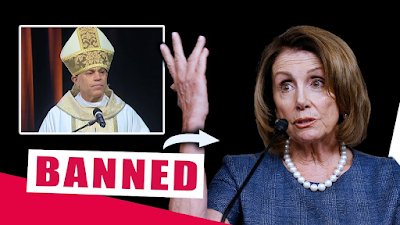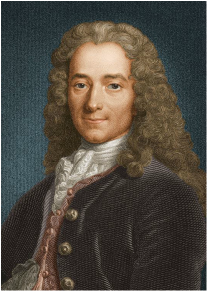I came across the homily below while doing a little research on Voltaire. What a chilling story, Fr. Suriani tells. But it explains a lot about our own times. Think of Nancy Pelosi and other Catholic politicians, champions of child-killing and child-mutilation. They commit numerous mortal sins of scandal and then brag about what good Catholics they are. They seem to have no fear for their souls and the personal judgment. Perhaps that's because they consciously or unconsciously follow Voltaire's poisonous prescription. The Prime Minister of Canada, proudly pro-abortion Mark Carney, recently boldly went to communion after hearing a sermon condemning abortion. He left the church immediately after receiving. (Source) How many Catholics approach for Communion in the state of mortal sin? Only God knows, but in view of the extreme loss of faith, the number must be legion.
 |
| Mark Carney, Canadian Prime Minister, another scandalous Catholic politician |
This homily was given on June 2, 2002 at St. Pius X Church, Westerly, R.I. by Fr. Raymond Suriani. Read 1 Corinthians 11: 17-34; John 6: 51-58.)
Back in the 18th century, a young man wrote to Voltaire, the famous French philosopher of the Enlightenment, to tell him about a problem he was experiencing. He said that he desperately wanted to become an atheist, curse God, despise the Church, and renounce his Catholic faith—as Voltaire was exhorting people to do—but what stood in the way was a powerful attraction he felt to the Holy Eucharist.
How could he possibly rid himself of this unenlightened, superstitious belief in the presence of Jesus Christ in the Blessed Sacrament? That was the question he posed to Voltaire.
The philosopher wrote back and gave him the following advice:
Rather than telling him to stay away from church and the sacraments, Voltaire told the young man to go to church and to receive Communion as often as possible—five or six times a day. He said, "And as you do, say to yourself, ‘I do not believe; I hate God; this is pure superstition.’"
Then he told his young disciple to commit as many mortal sins as possible, while continuing to go to Communion. This combination, he maintained, would eventually destroy his faith completely.
And he was right. Four months later, the proud young man wrote back to say that he was now a committed, convinced atheist.
This was "Voltaire’s Prescription" for the total destruction of belief: step 1 was for a person to receive the Eucharist "in bad faith" (so to speak), without any intention of deepening his relationship with the Lord; step 2 was for a person to receive the Eucharist unworthily, without any repentance in his heart.
When I read this story about Voltaire the other day, I said, "Now, Lord, I understand. I understand why the faith of many Catholics is weak; I understand those polls which tell us that only a small percentage of Catholics accepts Church teaching on the Real Presence of Christ in the Eucharist; I understand why so many reject the authentic teaching of the Church on contraception and other moral issues; I understand these horrible priest scandals a little better; I understand why some priests preach their own version of the Gospel and not the one they’re mandated to preach by the Church. It’s because, in one way or another, they’ve all followed Voltaire’s Prescription. They may not have done it consciously, but they’ve done it nonetheless."
Think about it, my brothers and sisters:
What does it mean to receive the Eucharist in bad faith, without any intention of growing in one’s relationship with the Lord? For Voltaire’s disciple, it meant going to Communion regularly and openly professing disbelief. Now very few Catholics today go that far—I will admit that; but it’s clear from the polls that many Catholics today do receive Jesus in the Holy Eucharist while at the same time saying in their hearts, "I do not believe"—I do not believe in the Real Presence; I do not believe in the authority of the pope; I do not believe in hell or purgatory; I do not believe everything the Catholic Church authoritatively teaches in matters of faith and morals.
What Voltaire’s disciple did openly, they do internally.
Thus, they fulfill step 1 of his prescription for the destruction of their faith.
Step 2 involved receiving the Eucharist in the state of mortal sin. Concerning that issue, St. Paul tells us in 1 Corinthians 11: "Whoever eats the bread or drinks the cup of the Lord unworthily sins against the Body and Blood of the Lord. A man should examine himself first; only then should he eat of the bread and drink of the cup."
 |
| Pray that all our bishops will exercise their authority as a warning to those teetering on the abyss. Hell is forever. |
How many Catholics examine their consciences before they receive Communion? This is something I often think about as I distribute the Eucharist at Mass each week. I wonder how many people are actually receiving worthily! Let’s be honest about it: many mortal sins have now become mainstream in our culture: drunkenness, abortion, artificial contraception, sterilization, masturbation, missing Mass on a Sunday or holy day—to name but a few! Because these serious sins are so "mainstream," it’s very easy for Catholics to disregard them and come to Communion when they shouldn’t—just as Voltaire’s disciple disregarded his sins and continued to receive the Body and Blood of the Lord.
Of course, part of the blame here must go to those priests who don’t properly instruct their people on these matters! Sad to say, but some priests are much better at excusing sin than they are at preaching about it. And that’s a tragedy—as well as a terrible disservice to God’s people! Instead of helping the members of their flock to be holy, they’re helping them to fulfill step 2 of Voltaire’s Prescription!
[b]The Lord says to us in Isaiah 1: "Though your sins be like scarlet, they may become white as snow." God will forgive any and every sin a million times over, but for that to happen we must acknowledge the sin and seek the remedy: the Blood of Christ which washes away our sins in Baptism and in the sacrament of Reconciliation.
Some of you are struggling with serious sins in your lives right now, but you go to Confession often so that you’ll always be in the state of grace whenever you receive the Holy Eucharist. Please don’t think step 2 of Voltaire’s prescription applies to you, because it doesn’t! It applies only to those who knowingly commit serious sins—like Voltaire’s disciple—and then go to Communion, without prior Confession and without a firm purpose of amendment. And here’s the sad irony: every time these men and women receive the Eucharist in the state of mortal sin, they actually damage their faith instead of strengthening it.
Needless to say, that’s not the way it’s supposed to be!
In John 6, Jesus tells us about the power of the Holy Eucharist, a power he wants everyone to experience! In the excerpt from that chapter which we heard a few moments ago, he says, "I am the living bread that came down from heaven; whoever eats this bread will live forever; and the bread that I will give is my flesh for the life of the world."
That is true, provided we receive the Eucharist in faith and in the state of grace![/b]
Let me conclude today with a story that illustrates this power beautifully:
At about the same time that Voltaire offered his infamous prescription to his disciple, Elizabeth, a young Episcopalian mother of five, took a trip with her husband William and oldest daughter to Italy. William’s business had been failing, his health had been deteriorating, and they thought a change of climate and scenery would help him both physically and emotionally. Tragically, however, William died in Pisa on December 27, 1803. Because Elizabeth and her daughter also became ill, it was 3 months before they could get back to the United States. Thankfully during that time they were well taken care of by an Italian family, the Filicchis, who had been business associates of William for a number of years.
The Filicchis were also devout Catholics.
For 3 months Elizabeth found herself deeply impressed by the way the members of this family practiced their faith. But what struck her most of all was their devotion to the Eucharist: their faithful attendance at Mass; the reverence they showed when they received Communion and returned to their pew to pray; the awe they exhibited toward the Blessed Sacrament when it was carried in procession on special feast days. And she began to sense that there was healing for her broken heart in this special sacrament.
Consequently, when she got back to the United States, she decided to convert to the Catholic faith. Later she described her First Holy Communion as the happiest moment of her life.
Such is the power of the Eucharist, when it’s received by people who have the right disposition of mind and heart! Like the Felicchis! Not only does it benefit the recipient spiritually and give that person eternal life as Jesus promised; receiving Communion with devotion can also help to the change hearts of others, and convert those who do not share our Catholic faith.
And, in the case of the Felicchis, their devotion to the Eucharist actually helped to make a saint!
Because the woman who stayed with them for 3 months in 1804 was none other than Elizabeth Seton: wife, mother of 5, widow, convert, the person often credited with starting the Catholic School System here in the United States, and the first native born American ever to be canonized by the Church.
################################
Voltaire made a prediction that the Bible would become a relic by 100 years after his death. The reality? The Paris home he lived in has become the headquarters of the French Bible Society. And the Bible continues to be spread all over the world. Voltaire is dead. God is eternal. But Voltaire's legacy of disbelief lives on in the "progressives" of today who inspire violence and hatred all over the globe in the name of "social justice." God help them all. Let us pray for their conversion and for our own perseverance in the faith until God calls us home. That is a prescription for heaven!


If you're telling yourself you don't believe then its not gonna make much difference what else you do. If they left off the eucharist part it'd work out the same. The difference is ita effwcr on others. Going to church as a diabeliever ia spreading the contageon to others. That's the trick Voltaire had in mind.
ReplyDelete